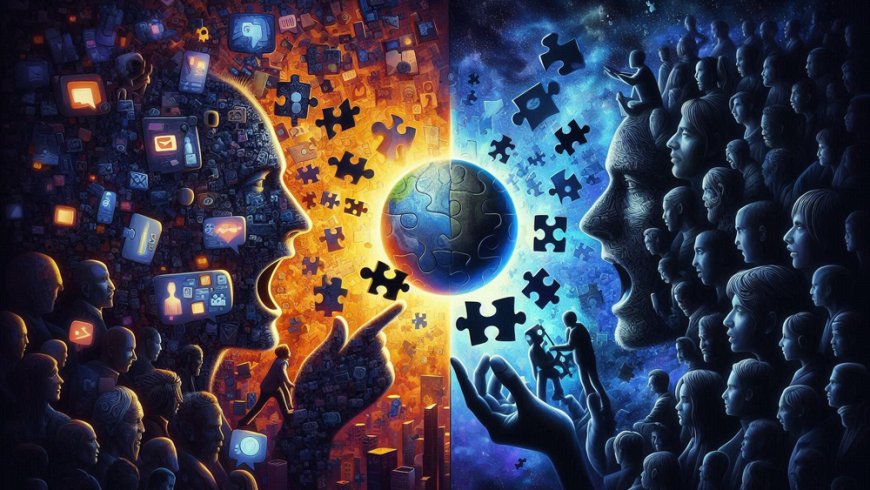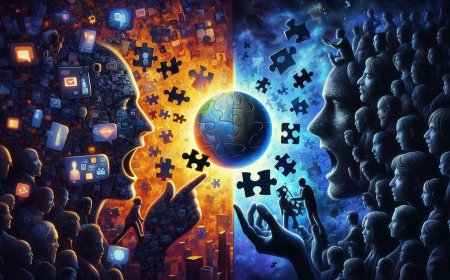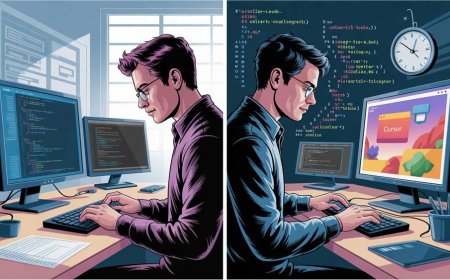Social Networks and Fragmented Thinking: The Crisis of Synthesis in the Age of Digital Polarization
An analysis of fragmented thinking in the age of social media and the decline of synthesis, dialogue, and collective negotiation. In the age of social networks, polarization dominates, thinking fragments, and synthesis disappears. This article explores how dialogue and negotiation culture has eroded—and how we might rebuild it through a Sharism-inspired vision of shared understanding.

In today’s hyper-connected world, fragmented thinking has become the new norm. Every user, equipped with a smartphone and a connection, can erect their own “tower of opinion”—sealed off and resistant to debate. On one hand, this phenomenon has democratized access to public expression; on the other, it has deeply undermined our ability to synthesize, a fundamental process for addressing major political, economic, and social issues.
The End of Shared Synthesis
Historically, societies have developed systems of dialogue and negotiation to transform differences into shared solutions. Parliaments, negotiation tables, unions, international forums—all imperfect tools, but based on the idea that a plurality of interests can converge toward a useful compromise. Today, social dynamics have radically shifted this paradigm.
Every issue is shattered into micro-perspectives, each reinforced by likes, retweets, and comments that form self-reinforcing echo chambers. Dialogue becomes confrontation. Dialectic is replaced by provocation. The urge to assert one’s point outweighs the willingness to understand the other’s.
Polarization as a System Design
Social networks, by design, reward engagement—and the easiest form of engagement is born from conflict. Selective algorithms show us what we already believe, reinforcing convictions and radicalizing differences. In this environment, moderate or balanced positions struggle to emerge—they are too “lukewarm” to attract attention. Thus, every topic—from climate change to healthcare, social justice to international politics—becomes a trench war between irreconcilable factions.
The Erosion of Negotiation Culture
In this context, negotiation—understood as the art of dialogue, mediation, and reasoned compromise—is increasingly seen as weakness or betrayal. The figure of the mediator fades, replaced by influencers and pundits who thrive on polarization to maintain visibility. Even democratic institutions, founded on the need for deliberation and mediation, are being delegitimized.
But negotiation is not an act of surrender. It is an ancient and refined discipline that has helped civilizations avoid war, resolve crises, and evolve. Social media, by contrast, have uprooted this culture from the ground up, pushing us toward impulsive reaction rather than thoughtful reflection.
Violence and Emotional Disproportion
This decline in the ability to negotiate is reflected in everyday life. More and more often, we witness public and private reactions that seem disproportionate to the actual problems: collective outrage over minor details, verbal aggression over differing opinions, hostility in even the smallest debates. It's as if society has lost the ability to calibrate emotional intensity to the real weight of a situation.
When synthesis is missing, proportion is lost. And when proportion is lost, even common problems—which should call for common sense and cooperation—become flashpoints for conflict.
Toward a New Paradigm?
Regaining the ability to synthesize is one of the great challenges of our time. We need a new education in complexity, an emotional and critical literacy that distances us from instant reactivity and brings us back to deep reflection. We must restore the value of slow thinking, the patience of dialogue, and the courage to compromise.
Social media don’t have to be enemies of discourse. But to become tools of synthesis—rather than factories of fragments—they must be rethought in logic and ethics. And we, as users, must reclaim responsibility for long-form thinking, for measured speech, for the possibility of changing our minds.
Only then can we start building together again—instead of remaining forever divided.
What's Your Reaction?


































